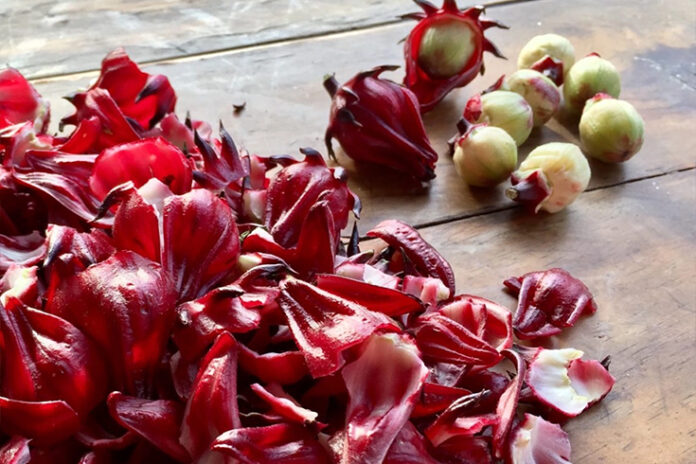In a recent clinical study reported by IHR Magazine, a polyphenol-enriched blend of lemon verbena and hibiscus has shown promising results in aiding weight management for overweight adults. Over 90 days, participants experienced an average weight loss of 3 kg and a significant reduction in body fat—approximately 6%—without changing their diet or exercise routine. In addition to weight loss, the study found improvements in satiety and a 7% drop in cholesterol levels, positioning this botanical blend as a potential natural alternative for those seeking effective, side effect-free weight loss solutions.
Significant Weight Loss
Participants who took 300 mg daily of the botanical blend saw an average weight reduction of 3 kg (~3.4% of total body weight). This weight loss was achieved without changes to diet or exercise, which is particularly notable. The fat loss was concentrated in the upper body, as confirmed through DEXA scans and bioimpedance measurements.
Reduction in Body Fat
The study showed a 6% reduction in body fat among the participants, with a 1.7% decrease in total fat mass. Interestingly, visceral fat (fat around the abdominal organs, associated with metabolic risks) decreased by 8.2%, which suggests that the blend may help target unhealthy fat storage areas.
Appetite Control and Satiety
One of the standout benefits was the increased satiety after meals. Participants reported feeling fuller for longer periods, which likely helped them reduce food intake without feeling deprived. These effects were especially noted after meals, with improvements starting as early as 30 days into the intervention.
The increase in satiety is believed to be linked to the activation of the GLP-1 hormone, known for its appetite-regulating properties. This could provide a natural method of controlling hunger, reducing the need for calorie restriction.
Cholesterol Reduction
A significant finding was the 7% reduction in cholesterol levels, specifically LDL (“bad”) cholesterol. This suggests that the botanical blend might help improve lipid profiles, making it a potentially valuable tool for cardiovascular health alongside weight loss.
Blood Pressure and Glucose Levels
No significant changes were observed in blood glucose or blood pressure levels. Since participants were normoglycemic (normal blood sugar levels) and had normal blood pressure at baseline, this suggests that the blend does not negatively impact these parameters in healthy individuals. It’s a promising sign for the product’s safety profile, especially for those concerned about potential drops in glucose or blood pressure.
Mechanisms of Action
The blend’s effects are thought to be related to its AMPK activation—a key energy sensor that plays a role in fat metabolism. By activating AMPK, the blend helps reduce fat synthesis and increase fat burning, which may explain the observed fat loss. Additionally, polyphenols from lemon verbena and hibiscus are known for their anti-inflammatory and antioxidant properties, which may further contribute to metabolic improvements.
Safety and Compliance
The 300 mg dose used in the study was well-tolerated, with no reported adverse effects. A lower dose, compared to the 500 mg used in previous studies, offers advantages such as fewer capsules to consume, which can help improve adherence to the regimen. This is crucial, as pill fatigue is a common issue in long-term treatments.
It is obvious for health food stores, the findings from this study present a valuable opportunity to diversify product offerings with a more holistic, science-backed solution. As Consumers are increasingly seeking alternatives to traditional weight loss supplements, and a polyphenol-rich blend of lemon verbena and hibiscus provides a plant-based option with proven benefits that give you an edge over mass-market.
References:
Wyatt, S.B., Winters, K.P., & Dubbert, P.M. (2006). Overweight and obesity: Prevalence, consequences, and causes of a growing public health problem. American Journal of the Medical Sciences, 331(4), 166-174.
- Ng, M., Fleming, T., Robinson, M., Thomson, B., Graetz, N., Margono, C., et al. (2014). Global, regional, and national prevalence of overweight and obesity in children and adults during 1980–2013: A systematic analysis for the Global Burden of Disease Study 2013. The Lancet, 384(9945), 766–781.
- Herranz-López, M., Barrajón-Catalán, E., Segura-Carretero, A., Menéndez, J.A., Joven, J., & Micol, V. (2015). Lemon verbena (Lippia citriodora) polyphenols alleviate obesity-related disturbances in hypertrophic adipocytes through AMPK-dependent mechanisms. Phytomedicine, 22(6), 605-614.
- Lee, Y.S., Yang, W.K., Kim, H.Y., Min, B., Caturla, N., & Jones, J. (2018). Metabolaid® combination of lemon verbena and hibiscus flower extract prevents high-fat diet-induced obesity through AMP-activated protein kinase activation. Nutrients, 10(9), 1204.
- Boix-Castejón, M., Herranz-López, M., Olivares-Vicente, M., et al. (2018). Hibiscus and lemon verbena polyphenols modulate appetite-related biomarkers in overweight subjects: A randomized controlled trial. Food & Function, 9(6), 3173-3184.
- Silva, M., Cueva, C., Alba, C., Rodriguez, J.M., de Pascual-Teresa, S., et al. (2022). Gut microbiome-modulating properties of a polyphenol-enriched dietary supplement comprised of hibiscus and lemon verbena extracts. Journal of Functional Foods, 91, 105016.
- Marhuenda, J., Pérez, S., Victoria-Montesinos, D., Abellán, M.S., Caturla, N., & Jones, J. (2020). A randomized, double-blind, placebo-controlled trial to determine the effectiveness of a polyphenolic extract (Hibiscus sabdariffa and Lippia citriodora) in the reduction of body fat mass in healthy subjects. Foods, 9(1), 55.









